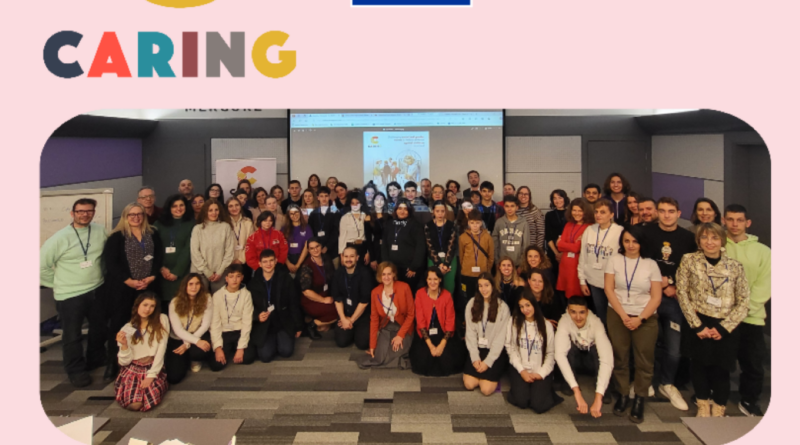Ending school violence: Children are part of the solution
A blog by Ciaran O’Donnell, Eurochild Partnerships and Programmes Coordinator.
On 16 January 2025, I was honoured to provide a keynote speech at the closing conference for the EU-funded CARING Challenging social and gender norms to reduce violence against children in school project. This inspiring project has brought together children, young people and professionals across four countries – Bulgaria, Croatia, Greece, and Romania – to tackle violence against children in education settings. Having worked in this field before my time in Eurochild, this type of initiative is always close to my heart.
The project has involved two Eurochild members, Terres des Hommes Lausanne Foundation’s Regional Hub and Office, and SAPI from Bulgaria, alongside other civil society organisations in the project’s countries.
Violence takes many forms – both direct and institutional or systemic. We know that exposure to violence severely affects a child’s physical, psychological and emotional development. It can absolutely affect someone’s ability to go to school – anyone who has experienced bullying firsthand knows that only too well. Experiencing violence affects our ability to interact socially and to thrive, both in our present and our futures. Evidence also shows that children in vulnerable situations can be especially affected, and there are obvious risks to mental wellbeing too.
My intervention was short, but I hope sweet. In it I shared some national and international trends, including evidence we have published in Eurochild in 2024, such as our new flagship report, Children’s Realities: Progress & Gaps, Our Rights. Our Future. The Europe We Want – Children’s recommendations to European Union decision makers, and the VOICE project’s Speaking up for change: Children’s and caregivers’ voices for safer online experiences.
Taken together, these sources tell a clear story. Violence – across its many forms – is still an everyday experience for too many children growing up in Europe today. But children are not just victims – they can and should have an active role in addressing violence. In our Speaking up for change report for example, concrete suggestions from children included teaching children about “appropriate online behaviour and how to protect yourself”.
The evidence in this research, as well the great work that has been done in the CARING project, can help create safer and violence-free systems for all children by informing national- and international-level change. The lessons learnt can inform Eurochild and Terre des hommes Daphne-CHILD programme, where many of the prospective grantees have a focus on school-based approaches to addressing violence against children.
Projects like the CARING project demonstrate innovative and child-led practices that are addressing violence against children at a community-level throughout Europe. They provide evidence for scaling up tried and tested approaches across different countries and cultures. In Eurochild, we celebrate and promote these interventions for wider use beyond their project duration.
In my closing recommendations for attendees, I pointed to three EU initiatives that will all benefit from these lessons:
1. EU Strategy on the Rights of the Child
- Namely Area 3: Combating violence against children & ensuring child protection
2. EU Recommendations on developing and strengthening integrated child protection systems in the best interests of the child, wherein Member States are:
- recommended to ensure safe spaces for children, both offline and online.
- invited to foster a safe and inclusive environment in education, and develop specific anti-bullying plans.
3. EU Guidelines on Wellbeing and Mental Health in School
- Recommendation 6 is for Member States to ensure the creation of safe schools to prevent and address various forms of violence, including gender-based violence and (cyber-)bullying.
- Together with children and our member Learning for Wellbeing Foundation, Eurochild will prepare a child-friendly version of these Guidelines to help the EU communicate them to all children in Europe.
Congratulations to all the participants of the CARING project – from the young people, the families, the professionals, and last but not least, the coordinating organisations, for your shared success. Thank you for having Eurochild join you to mark the close of your successful project, and all the best with its next iteration.
For more information about the CARING project, contact Márta Bene, Child Protetion Manager from Terre des Hommes.

